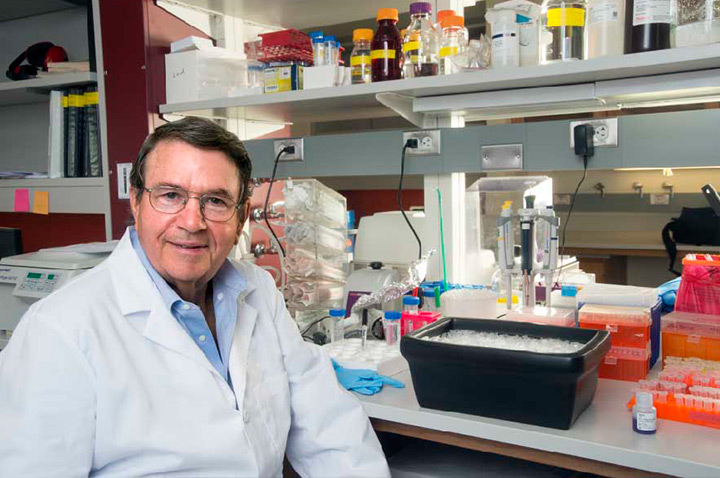Stillwater, Oklahoma - Oklahoma State University (OSU) has named six Champions of Agriculture for 2021 including Peru State Collage alumni, Arlan Richardson. From the OSU website for the Ferguson College of Agriculture, "The OSU Agriculture Champion Award recognizes and honors individuals who are not graduates of the Ferguson College of Agriculture, but who have brought distinction to OSU Agriculture and have demonstrated a continuing interest and commitment in agricultural sciences and natural resources."
More information from Oklahoma State University:
Arlan Richardson of Oklahoma City received his bachelor’s degree from Peru State College in Nebraska and his doctoral degree in chemistry from OSU. He currently serves as a senior research career scientist at the Oklahoma City VA Medical Center, as well as an adjunct professor for OSU’s Center for Veterinary Health Sciences.
As a leading authority on the effects and process of aging, Richardson also is the director of the Oklahoma Nathan Shock Aging Center and holds the Donald W. Reynold Endowed Chair of Aging Research Professor of Biochemistry and Molecular Biology.
John Gustafson, department head for OSU’s Department of Biochemistry and Molecular Biology, nominated Richardson and emphasized his strong connection to the department by the establishment and continued funding of the Dr. Arlan Richardson Biochemistry and Molecular Biology Undergraduate and Graduate Research Scholars Endowment fund.
“Professor Richardson has become a quintessential example of an OSU science graduate program success,” Gustafson wrote in the nomination packet. “He is richly deserving of recognition as a Champion, as he has consistently brought accolades back to our department and Division and actively supports our department’s multiple missions.”
More information from the Reynolds Oklahoma Center on Aging
Dr. Richardson has mentored and directed the research of more than 50 Ph.D. graduate students, postdoctoral fellows, and junior faculty and is the author of more than 240 peer-reviewed scientific publications.
In 1993, he received the Nathan Shock Award from the Gerontology Research Center at the National Institute on Aging for his pioneering research on the effect of dietary restriction on gene expression. In 1995, he received the Robert W. Kleemeier Award for outstanding research in the field of gerontology from the Gerontological Society of America, and in 2001 the Harman Research Award for research contributions in the field of aging and dietary restriction from the American Aging Association. He received the Irving Wright Award of Distinction in Aging Research from the American Federation for Aging Research (2008) and the Lord Cohen Medal for Services to Gerontology from the British Society for Research on Ageing. His leadership roles include serving as president of both the Gerontological Society of America and the American Aging Association.
In addition, Dr. Richardson served on the Board of Scientific Counselors at the National
Institute on Aging from 2002 to 2007 and the National Advisory Council on Aging from
2010 to 2013. In 1991, he was Chair of the Gordon Conference on the Biology of Aging,
San Miniato, Italy, and in 2008 the Chair/Organizer of the Keystone Symposium on Metabolic
Pathways of Longevity.
Dr. Richardson's research has focused on various aspects of aging, e.g., (i) the effects
of aging and dietary restriction on gene expression in rats and mice, (ii) testing
the oxidative stress theory of aging by measuring the effect of alterations in the
antioxidant defense system on the lifespan and pathology of transgenic and knockout
mice, and (iii) most recently, studying the effect of rapamycin on aging and age-related
diseases. His group was the first to show that dietary restriction altered gene expression
through changes in specific transcription factors. He is currently studying the mechanism
responsible for genotype differences in response to dietary restriction using mouse
models.
Over the past decade, Dr. Richardson's group has used over 15 transgenic and knockout mouse models with alterations in the antioxidant defense system to study how increased or decreased oxidative damage affects survival, e.g., transgenic/knockout mice for catalase, Cu/Zn-superoxide dismutase, Mn-superoxide dismutase, thioredoxin, glutathione peroxidase 1 and 4, and methionine sulfoxide dismutase. He is currently using conditional knockout and transgenic mice to Cu/Zn-superoxide dismutase to study the whether oxidative damage/stress induces cellular senescence which leads to accelerated aging and age-related diseases.
# # #
